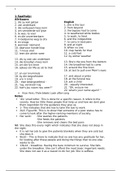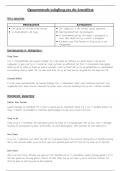1-Saalhulp:
Afrikaans
1. dis sy wat getaxi English
2. van anderkant 1. she is the taxi
3. die verbypad moes kom 2. from beyond
4. om verweerde wit lywe 3. the bypass had to come
5. te was, te voer 4. to weathered white bodies
6. en die onverteerbare 5. to wash, to feed
7. in bedpanne weg te dra 6. and the indigestible
8. en snags 7. to carry in bed pans
9. wanneer niemand 8. and at night
10. daarvoor hande klap 9. When no one
11. 'n koue voet 10. clap hands for that
12. teen die winter weer 11. a cold foot
12. by winter weather
13. dis sy wat van onderkant
14. die broodlyn moes kom 13. She's the one from the bottom
15. om die fyn linne 14. the breadline had to come
16. oplaas oor Ma se oë te trek 15. around the fine linen
16. at last to pull over Mom's eyes
17. en oor krummels
18. by die begrafnistee 17. and about crumbs
19. vra 'n kind 18. at the funeral tea
20. - ewe belangstellend - 19. ask a child
21. "ag, verskoon tog 20. - equally interested -
22. hoe's jou naam nou weer?" 21. "Oh, excuse me
22. what's your name again? "
Vrye Vers / Pale-bleek/ Look after-sorg
Notes
‘dis’ small letter- This is done for a specific reason. It refers to the
society. How be little these people that help us and how we dont give
them regonition for the guidance they give us.
1- This indicates that she has to take the taxi to work.
2&3- Figuurlik- This is to show that someone of a poor status has to
come to look after the higher-ranking members of society.
Her work: -She washes the patients
-She feeds the patients
-She removes and cleans the bed pans
NB: She does this every night which indicates that she does not sleep in
the night.
It is not her job to give the patients blankets when they are cold but
she does it.
9&10 – This is there to indicate that no one has any gratitude for her,
for looking after these people and doing the things that no one else
wants to do.
13&14 – breadline- Having the bare minimum to survive. She falls
under the breadline. She can’t afford the most basic important needs.
She does not use it as a reason to do her job. She is selfless.
,2
She is also there for the patients who have passed on. 16- euphemism
to say her mother is dead.
17- She gets the leftovers (krums) at the funeral to eat.
19-22- ‘vra ‘n kind’ – Ma se kind- She asks her what her name is.
The child doesn’t care for the old people. The child should have been
there to look after her mother. She wasn’t there, that is why she
doesn’t know her name.
‘Daarvoor hande klap’ – When nobody is there to applaud her. She
does all these kind acts. She handels all her patients with compassion.
We should learn from this poem that we should also look after our
parents when they are old because they also looked after us for
majority of ourlives.
Notas
• 'dis' kleinletter- Dit word om 'n spesifieke rede gedoen. Dit verwys na
die samelewing. Hoe min is hierdie mense wat ons help en hoe ons hulle
nie weer regkry vir die leiding wat hulle aan ons gee nie?
• 1- Dit dui aan dat sy die taxi moet neem werk toe.
• 2 & 3- Figuurlik- Dit is om aan te toon dat iemand met 'n swak status na
die hoër rangorde van die samelewing moet omsien.
• Haar werk: -Spoel die pasiënte uit
- Sy voed die pasiënte
-Sy verwyder en maak die bedpanne skoon
NB: Sy doen dit elke aand wat aandui dat sy nie snags slaap nie.
• Dit is nie haar taak om die pasiënte komberse te gee as hulle koud is
nie, maar sy doen dit.
• 9 & 10 - Dit is hier om aan te dui dat niemand haar dankbaar is vir die
versorging van hierdie mense en die dinge doen wat niemand anders wil
doen nie.
• 13 & 14 - broodlyn - Om die minimum te oorleef. Sy val onder die
broodlyn. Sy kan nie die belangrikste basiese behoeftes bekostig nie. Sy
gebruik dit nie as 'n rede om haar werk te doen nie. Sy is onbaatsugtig.
• Sy is ook daar vir die pasiënte wat oorgegaan het. 16 - eufemisme om te
sê haar ma is dood.
• 17- Sy kry die oorskietkos by die begrafnis om te eet.
• 19-22- ‘vra‘ n kind ’- Ma se kind- Sy vra haar wat haar naam is.
• Die kind gee nie om vir die ou mense nie. Die kind moes daar gewees
het om na haar ma om te sien. Sy was nie daar nie, daarom ken sy nie
haar naam nie.
• 'Daarvoor hande klap' - As niemand daar is om haar te loof nie. Sy doen
al hierdie soort dade. Sy verhandel al haar pasiënte met deernis.
• Ons moet uit hierdie gedig leer dat ons ook na ons ouers moet omsien
wanneer hulle oud is, omdat hulle ook na die meerderheid van ons lewens
omsien.
Vrae:
, 3
1. Skryf twee aanhalings uit die gedig neer wat die saalhulp se
sosiale omstandighede beskryf.
"van anderkant die verbypad" en "van onderkant die broodlyn"
2. Noem die drie take wat sy in die hospitaal moet doen.
Sy was en voer pasiënte en sy dra bedpanne weg
3. Watter ander taak doen sy uit liefde?
Sy sorg dat hulle voete warm is in die winter.
4. Wat beteken dit as die laken oor iemand se oë getrek word?
Die persoon het gesterf.
5. Waarom word "Ma" in reël 16 met 'n hoofletter geskryf?
Dit is die spreker se ma.
6. Watter twee woorde in die eerste drie reëls sê vir ons dat die
saalhulp nie baie keuses het nie?
"getaxi", "moes"
7. "verweerde wit lywe" in reël 4 is 'n voorbeeld van? Motiveer jou
keuse.
Metonimia. verweerde wit lywe" verwys na die pasiënte; dit is dus
oornoeming.
8. Waarom, dink jy, praat die spreker juis van "wit lywe"?
Daar is genoeg aanduidings in die gedig dat hierdie saalhulp 'n arm,
naamlose swart vrou is wat hierdie ondankbare werk vir wit mense moet
doen.
9. Sê of die stelling waar of onwaar is. Gee 'n rede vir jou antwoord.
‘Die saalhulp doen net wat van haar verwag word.’
Onwaar. Sy help hulle snags wanneer niemand vir haar hande klap nies
10. Met watter ander woord in die gedig skakel "broodlyn" (reël
14)?
"krummels"
11. Wat is die spreker se houding teenoor die saalhulp?
Hy respekteer die werk wat sy doen.
12. Wat sou jy sê, is die tema van die gedig? Verduidelik jou
antwoord.
Mense leef by mekaar verby en ware onbaatsugtige diens word nie
raakgesien nie/word as vanselfsprekend aanvaar.
Questions:
1. Write down two quotes from the poem that describe the ward's
social circumstances.
"from beyond the bypass" and "from below the breadline"
2. Name the three tasks she has to do in the hospital.
She was washing and feeding patients and she carried away pans
3. What other task does she do out of love?
She keeps their feet warm in the winter.
4. What does it mean if the sheet is pulled over someone's eyes?
The person died.
5. Why is "Ma" capitalized in line 16?
This is the speaker's mother.
, 4
6. Which two words in the first three lines tell us that ward help
does not have many choices?
"taxi", "had to"
7. "Weathered white bodies" in line 4 is an example of? Motivate
your choice.
Metonimia(It refers to patients). weathered white bodies "refers to
the patients; it is therefore a takeover.
8. Why do you think the speaker is talking about "white bodies"?
There are enough indications in the poem that this ward aide is a
poor, unnamed black woman who has to do this thankless job for
white people.
9. Say whether the statement is true or false. Give a reason for
your answer.
"The ward assistant does just what is expected of her."
False. She helps them at night when no one claps her hands
10. What other word in the poem links "breadline" (line 14)?
"crumbs"
11. What is the speaker's attitude towards ward help?
He respects the work she does.
12. What would you say is the theme of the poem? Explain your
answer.
People live past each other and true selfless service is not seen /
taken for granted





